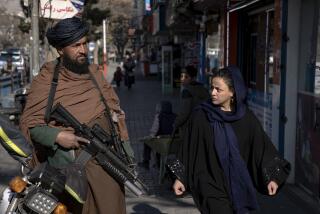Scheduled Hanging of Muslim Puts India in No-Win Situation
NEW DELHI — If the courts prevail, a hangman will loop a noose around the neck of one of India’s most notorious convicts at dawn Friday, and the saga of an audacious crime involving acts of terrorism and threats of war will end at the gallows.
But the scheduled execution of Mohammed Afzal is no simple affair. The case has forced the Indian government to wrestle with competing demands for justice, the specter of increased sectarian violence and the potential for more upheaval at a delicate moment in India’s adversarial relationship with Pakistan.
The bearded, bespectacled Afzal was sentenced to die for his role in a brazen attack on India’s parliament in 2001, a shootout that killed 14 people, including five Kashmiri militants, here in the capital. India blamed Pakistan for inciting and aiding the assailants, and the nuclear-armed neighbors nearly went to war.
Since then, the archrivals have stepped back from the brink, engaging in a fitful peace process that has led to small progress toward rapprochement.
At the same time, Afzal’s case has wound its way to the top of India’s judicial system. Last year, the Supreme Court upheld his conviction as a conspirator in the attack. The panel pronounced him deserving of the ultimate punishment, despite acknowledging that his role was limited to providing shelter, cellphones and transportation for the gunmen.
Since the court last month set his execution for Friday, protests have flared both in support of and against the sentence. Critics say that hanging Afzal will create an instant martyr for militants in the Indian-controlled portion of Kashmir who want to unite that predominantly Muslim area with Pakistan or create an independent homeland.
On the other side are those who say commuting the sentence to life imprisonment would subvert the rule of law, thwarting the court’s ruling that society’s “collective conscience ... will only be satisfied” by the death penalty in such a heinous case.
Afzal’s wife has filed a clemency plea with Indian President A.P.J. Abdul Kalam. But since his is a ceremonial post, the real decision lies with Prime Minister Manmohan Singh’s government, which finds itself with few choices, none of them palatable.
“It is kind of a dilemma right now because every move is wrong,” said Ajai Sahni, executive director of the Institute for Conflict Management in New Delhi.
“If you hang the man, the terrorists and their front organizations and their supporters are going to whip up a frenzy, saying, ‘Look at what has been done -- a Kashmiri Muslim has been hanged,’ and they’re going to try to use it to exploit or mobilize more troops for their cause,” Sahni said.
“If you don’t hang the man, they’re again going out in the streets in celebration of the victory they have secured over the Indian state
Many analysts doubt Afzal will face the hangman’s rope as scheduled. Rather, the president’s office may prolong consideration of the petition for mercy, which would delay the execution until a decision was announced. But that would merely postpone the debate, not resolve it.
The controversy comes at a sensitive juncture in relations between India and Pakistan and in the dispute over Kashmir, the main bone of contention between the countries, both of which claim the divided Himalayan region as rightfully theirs.
The two sides are due to resume talks in November after months of delay brought on by the July bombings of commuter trains in Mumbai, which killed about 200 people. Indian investigators accuse Pakistan’s intelligence agency of helping Kashmiri militants carry out the attacks.
Further unrest in Kashmir caused by Afzal’s execution could complicate the negotiations.
Also, Indian officials probably are loath to aggravate tensions in the mountainous territory just when military commanders say that violence there is waning somewhat -- an assertion that some experts question.
“Violence levels have come down by 20%. There may be an odd incident of a grenade thrown at one place or the other, but that can happen anywhere in the world,” Gen. J.J. Singh, chief of staff of the Indian army, told reporters this week.
Farooq Abdullah, the former chief minister of India’s Jammu and Kashmir state, where Afzal is from, warned of an eruption of religious strife if Afzal were to go to the gallows.
“You want to hang him? Go ahead and hang him.... This nation will go up in flames, because the terrorists will do things which will destroy the relationship of the Hindus and Muslims here,” Abdullah told an Indian news channel over the weekend.
In Srinagar, the summer capital of Jammu and Kashmir state, police scuffled Monday with dozens of demonstrators protesting the execution order and demanding freedom for Afzal.
Some human-rights organizations and legal activists say the death sentence ought to be overturned on legal grounds, alleging that Afzal’s trial was marred by inadequate legal representation and that the evidence against him was purely circumstantial.
The condemned man’s wife, with their 7-year-old son in tow, also made numerous public appeals in her husband’s behalf.
But most agree that any reversal would be motivated by political concerns -- valid ones, according to columnist Karan Thapar of the Hindustan Times, one of several newspapers that have argued for clemency for Afzal, though for different reasons.
“Remember, we’re not talking of a pardon but simply remission of a death sentence into imprisonment for life,” Thapar wrote in Sunday’s edition. “And, arguably, it’s for the greater good of India.”
More to Read
Sign up for Essential California
The most important California stories and recommendations in your inbox every morning.
You may occasionally receive promotional content from the Los Angeles Times.











